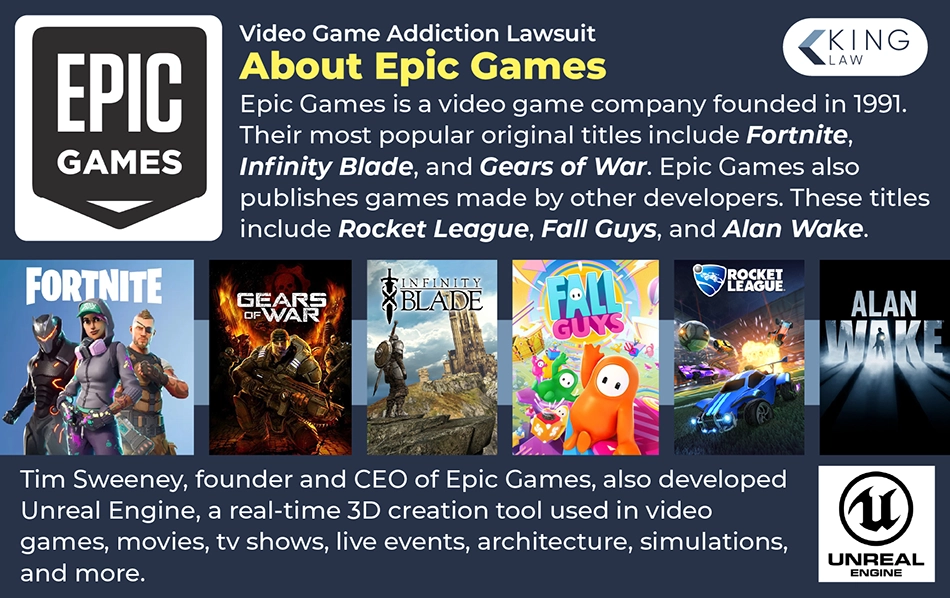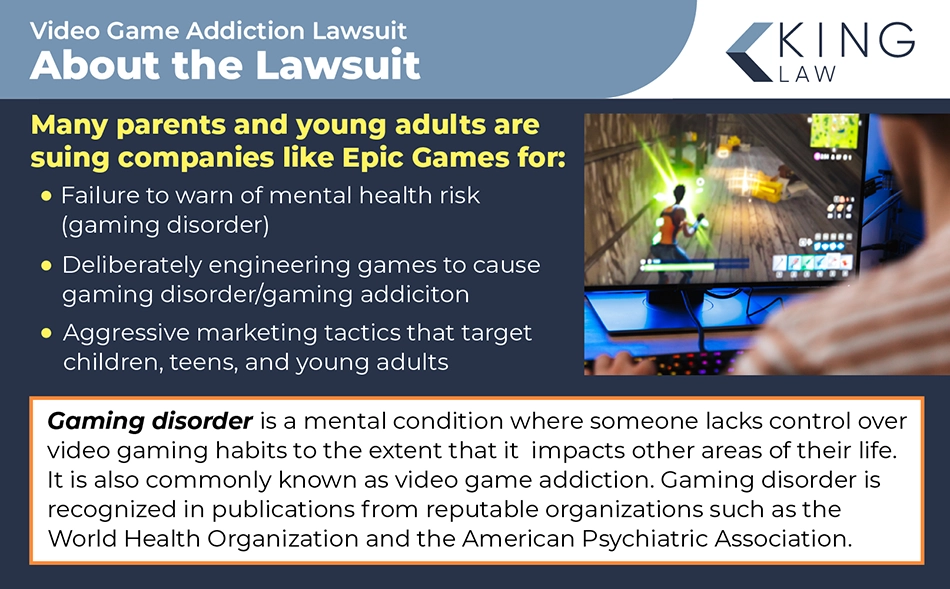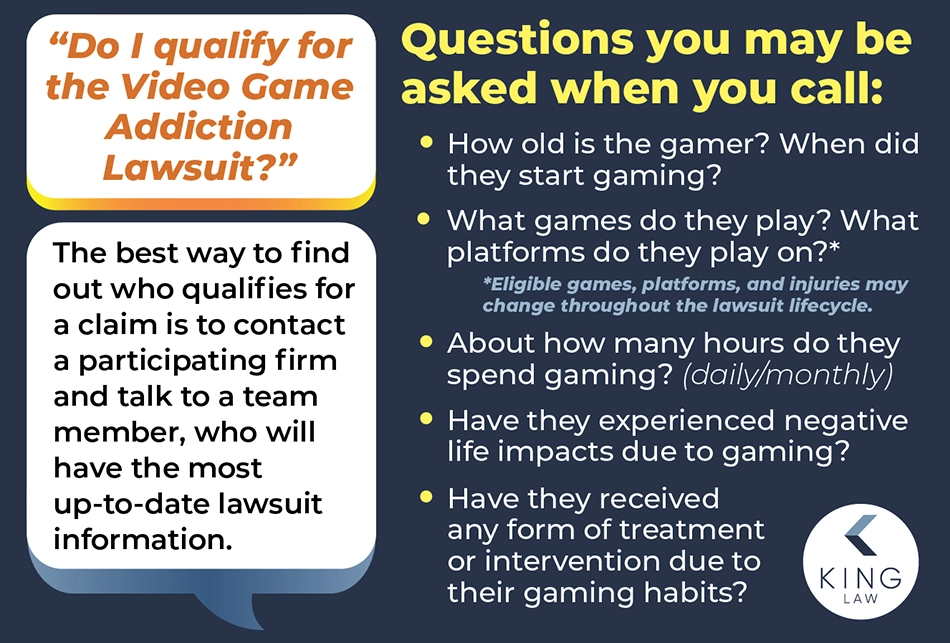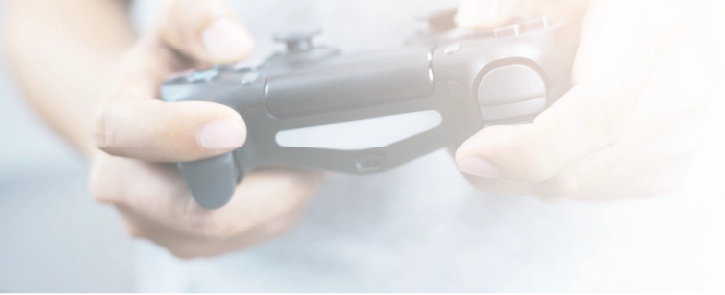Complete the form below to see if you qualify for a Video Game Lawsuit

Lawsuits filed against Epic Games accuse the developer of purposefully designing their video games to be addictive to children and teens. Many parents and young people are suing Epic Games because they or their children suffered mental and physical injuries due to addiction to Epic Games’ products. They allege these injuries are a result of Epic Games’ negligence and predatory behaviors.
This page equips parents and young people with the information they need to file a claim against Epic Games, navigate the legal process, and understand if they qualify for compensation.
Epic Games Lawsuit – 2025 News and Updates
November 18, 2025: Video Game Addiction Lawsuit Against Epic Games May Be Consolidated
On December 4, 2025, the Judicial Panel on Multidistrict Litigation (JPML) will hear arguments regarding the creation of a group lawsuit. If the request is approved by the panel, people who became addicted to games developed by Epic could band together and benefit from a group litigation. Epic Games is listed as a defendant in lawsuits being brought before the JPML. Plaintiffs in these lawsuits say the company purposefully designs its games to be addictive and markets those games to children. Therefore, the company should be held liable for the harm it causes to minors. Epic produces many popular games, including Fortnite, Rocket League, and Fall Guys.
October 20, 2025: Epic Games’ Challenge of Play Store Design is Successful in Court
According to the United States Supreme Court, Google must change the way it structures certain features on its Play Store app. Epic Games had filed a lawsuit against Google, saying the Google app store’s design and restrictions limited competition. Epic Games filed this case to allow more people to download its mobile video game titles. Epic Games is the studio behind blockbuster titles like Fortnite, which have caused hundreds of children and young adults to develop gaming disorders. Individuals and families impacted by young people’s addictions to Epic Games’ titles are filing lawsuits to seek compensation.
September 3, 2025: Epic Games Releases New Suite of Free Games, More Children Become Addicted to Its Titles
Epic Games has released a robust new offering of free and heavily discounted games on its online store. Some of the games include Monument Valley, Deliver at all Costs, and the Battle of Polytopia. Giving players a chance to access free titles drives interest in Epic Games and the video games it creates, which include Fortnite. Young people across the United States are becoming increasingly dependent on video games like Fortnite, and the fallout of these addictions is the subject of many lawsuits.
August 1, 2025: Epic Games Releases Trailer of Upcoming Kristala App
Several parents and concerned advocates have filed lawsuits against Epic Games, alleging that the company knowingly created addictive video games that have harmed their children. Some of the injuries cited in complaints include children experiencing violent outbursts if they cannot play Epic Games’ content. Meanwhile, Epic Games denies liability for the immense harms that children and families have experienced. The company continues to publish new features, such as the trailer for Kristala’s early access release, which can fuel addictive behaviors, especially in young people.
June 2, 2025: Epic Games Announces Upcoming Summer Game Fest 2025 as More Children Become Addicted to Its Video Games
Epic Games’ Summer Game Fest 2025 kicks off Friday, June 6, 2025, and will feature indie game expos, game demonstrations, and more. Some events begin on June 3 to fuel interest ahead of the festival, which lasts until June 15. Many vendors participate in the Summer Game Fest annually to increase their followings. Epic Games makes titles like Fortnite, which young people are becoming addicted to. These festivals drive game interest and time spent playing games. Such tactics are the subject of lawsuits against Epic and other game developers.
April 2025: Study Shows Adolescents with Gaming Disorder Were More Likely to Be Cyberbullies
A study called, Prevalence and predisposing factors of digital game addiction and cyberbullying in adolescents: A cross-sectional study looked at the rates of gaming addictions and cyberbullying in 1,002 high schoolers. According to the results, about 41.5 percent of the participants showed symptoms of an addiction to video games like those published by Epic Games. Additionally, adolescents who were addicted to video games were about two times more likely to be cyberbullies. This study highlights some of the negative consequences of playing video games excessively.
December 13, 2024: Evette Gibson Sues Epic Games Because of Son’s Addiction to Fortnite and Other Titles
Evette Gibson, a California mom, filed a claim against Epic Games and other video game manufacturers after her son, I.H.G., developed an addiction to Fortnite and other titles. I.H.G. became so dependent on video games that he experienced significant problems in school and had to attend counseling to help him address his mental health challenges. His mother sued Epic Games to hold them accountable for not warning her about or protecting I.H.G. from the harmful effects of its video games.
June 5, 2024: U.S. Judicial Panel on Multidistrict Litigation Denies Bid for Some Plaintiffs To Create MDL
The plaintiffs in five lawsuits asked the United States Panel on Multidistrict Litigation to create an MDL against Epic Games and other video game manufacturers. The plaintiffs in these cases experienced significant losses, including mental health issues and financial setbacks, after they or their children developed an addiction to titles published by Epic Games and many other video game developers. The panel reviewed the lawsuits and determined that it would not be appropriate to create an MDL with these cases at that time. The panel said those specific plaintiffs’ claims were too different from each other to be consolidated. Plaintiffs continue to file Epic Games lawsuits in state court, and an MDL may be formed in the future.
November 28, 2023: Preston Johnson Sues Epic Games After Becoming Addicted to Video Games
Preston Johnson and his mother, Elizabeth Jones, sued Epic Games and other video game manufacturers because Preston developed significant mental health, financial, academic, and behavioral challenges after becoming addicted to Fortnite and other titles. Preston believes the addictive nature of Epic Games’ products caused him to develop a gaming disorder. His disorder progressed to the point where he dropped out of school, experienced major depressive disorder, and had extreme behavioral outbursts. Preston and his mother are seeking compensatory damages for the harm they believe they endured because of Epic Games’ misconduct.
January 2, 2018: Gaming Disorder Added to WHO’s List of Recognized Conditions
The World Health Organization included gaming disorder in its 11th International Classification of Diseases (ICD), which was released in 2018. The WHO’s listed symptoms of gaming disorder include a “pattern of gaming behavior” that significantly disrupts multiple areas of someone’s life for at least 12 months. For example, the person’s gaming addiction may cause them to neglect their physical hygiene, drop out of school, lose their job, or destroy their relationships. Many young people have developed a gaming disorder after playing Epic Games’ Fortnite title.
About the Epic Games Lawsuit:
What to Know About the Epic Games Lawsuit
Is There An Epic Games Class Action Lawsuit?
What Epic Video Games Are Involved in the Lawsuit?
What Are the Grounds for the Epic Games Lawsuit?
Studies Link Epic Games to Video Game Addiction in Teens and Young Adults
Who Qualifies to File a Claim Against Epic Games?
How to File an Epic Games Lawsuit Claim for Video Game Addiction
Deadline to File an Epic Games Video Game Addiction Lawsuit
Estimated Epic Games Lawsuit Settlement Amounts
What to Know About the Epic Games Lawsuit
Parents and young people are suing Epic Games, the maker of blockbuster titles like Fortnite and Rocket League, because children, adolescents, and teenagers are developing gaming disorders after playing the company’s games. Epic Games lawsuits accuse the company of intentionally creating games, like Fortnite, to be addictive.
The people filing these claims believe the company’s actions put the mental, physical, academic, and financial well-being of young people at risk. They also think Epic Games knew about these complications but did not do enough to protect the public or warn about the potential consequences of video game addiction. As more individuals file claims at the state level, the lawsuits may be combined into a single multidistrict litigation in federal court.

About the Video Game Addiction Lawsuit Multidistrict Litigation (MDL)
A multidistrict litigation, or MDL, is a federal case that is created when many people file lawsuits all at once against the same defendants for similar claims. As part of the MDL, the large group of claimants and their attorneys would work together for the pre-trial phases. For example, they would send out requests for documents or information, interview experts, and file pre-trial motions as a group.
Then, they would conduct test trials (called Bellwether trials), which could help guide the future of the claims. Each plaintiff would then resolve their own claim as part of the settlement or in their own trial. Currently, there is no federal MDL for the lawsuit against Epic Games; however, one may form in the future after more plaintiffs file individual cases.
Epic Games’ Role in the MDL
Epic Games publishes several video games, such as Fortnite, which many people feel are highly addictive. For example, Fortnite’s timed, engaging, fast-paced matches often result in the user nearly winning the level, which encourages them to play for longer as they seek the dopamine rush from being victorious. Consumers believe Epic Games developed manipulative design features, like the timed matches, to keep players on the platform longer and longer. They accuse Epic Games of negligence, failure to warn the public about the known risks to young users, and deceptive practices. If an MDL forms, Epic Games will likely be named as a defendant.
Is There An Epic Games Class Action Lawsuit?
There is no certified class action lawsuit or MDL against Epic Games yet. In June 2024, several plaintiffs attempted to consolidate their video game addiction claims into an MDL. The plaintiffs in those cases sued many developers, such as Epic Games, and accused those companies of intentionally creating an addictive game for young people. At that time, the U.S. Judicial Panel on Multidistrict Litigation declined the request because those specific plaintiffs’ claims were too different from each other.
However, many parents and young people have continued to file individual lawsuits against Epic Games after they discovered the impact of addictions to video games like Fortnite on their lives. Another MDL may be formed in the future, among plaintiffs whose legal claims are more similar.
What Epic Video Games Are Involved in the Lawsuit?
Epic Games develops and publishes dozens of video games, including Fortnite, Rocket League, and several Star Wars titles. Many of the lawsuits center around children who have developed addictions to Fortnite. However, more games may be added to the lawsuits depending on how those titles impacted the children’s mental health.
Fortnite
Fortnite is one of the central titles in the cases against Epic Games. Parents and young people allege that Fortnite is intentionally created to draw in and capture the minds of children and adolescents, who are less likely to be able to self-monitor their impulses and game time.
For example, young users are bombarded with social pressures to play for hours on end in the hopes of achieving a high ranking and winning exclusive rewards. Fortnite also sells battle passes and hosts many limited-time or live events, which attract users to return to and stay on the platform so they do not feel left out. Users can also customize their Fortnite experience by buying skins, emotes, weapons, and resources so their character feels uniquely “them,” something that is very alluring to children and adolescents. Many parents have filed lawsuits over Fortnite addiction.
Rocket League
Previously owned by Psyonix, Rocket League is now an Epic Games title. Many of Rocket League’s features encourage disordered gameplay. For example, competitive ranking systems and the use of microtransactions feed into the dopamine-seeking and release cycle of addiction. Parents have noticed concerning trends in how their children interact with this video game, and they have started speaking out about their experiences. Many parents have filed lawsuits after their children or teens developed an addiction to Rocket League.
Other Epic Video Games Named in the Lawsuit
Users may also become addicted to other games published or developed by Epic Games. Many Epic Games titles may use the same addictive mechanisms and features to keep children in the game for longer. Parents whose children have played Epic Games’ titles and experienced negative impacts on multiple areas of their lives may be entitled to compensation. Personal injury attorneys can help parents understand if they can sue Epic Games because of their children’s video gaming habits.
What Are the Grounds for the Epic Games Lawsuit?
Parents and young people accuse Epic Games of purposely designing video games that are addictive to children. Consumers believe Epic Games knew about the negative psychological impacts of their games on children but deliberately chose not to tell the public. Additionally, people think Epic Games used marketing tactics that targeted vulnerable gamers, such as children and adolescents.
Deliberate Engineering to Cause Video Game Addiction
The complaints against Epic Games accuse the company of intentionally adding and creating video game features that are addictive to children and young people. They believe Epic Games used the principles of behavioral psychology, like operant conditioning and variable rewards, to craft an engaging play environment that makes it hard for players to log off. Adolescents and children, whose brains are still developing, are more likely to fall victim to these tactics and develop disordered gaming habits because of it.
Failure to Disclose the Known Mental Health Risks for Minors
The people filing the lawsuits accuse Epic Games of failing to disclose the known mental health complications from playing video games like Fortnite. According to the complaints, researchers have been warning about how excessive video game play can lead to or worsen anxiety, depression, sleep disturbances, and video game addiction. However, concerned guardians do not believe that Epic Games passed this warning on to its customers. Additionally, many believe Epic Games chose to capitalize on the addictive nature of its games rather than protect and warn young people and their caregivers.
Aggressive Monetization Targeting Children, Teens, and Young Adults
Many accuse Epic Games of using aggressive and targeted marketing tactics aimed at children, teens, and young adults. They believe Epic Games used loot boxes, time-limited purchase offers, and in-app currency such as V-Bucks to pressure children to buy things. For instance, children may feel like they will be left out of their social group if they do not purchase special skins or emotes on Fortnite. Because of this, they may be more likely to make impulsive and repeated purchases on the platform, causing them and their parents emotional and financial injuries.

Studies Link Epic Games to Video Game Addiction in Teens and Young Adults
Numerous research articles have examined how video games can cause addiction in young people. Gaming titles like Fortnite that use rankings and variable reward systems can be especially addictive to children and teens. Because of the increased awareness of how video games are impacting young people, organizations like the World Health Organization have added gaming disorder to their list of recognized mental health conditions.
Study: Gaming addiction, problematic gaming and engaged gaming – Prevalence and associated characteristics
Gaming addiction, problematic gaming and engaged gaming – Prevalence and associated characteristics explored the gaming habits and mental wellbeing of 2,075 participants. The goal of the study, which was published on December 5, 2020, was to determine how many participants fell into the engaged, problem, and addicted categories of gaming habits.
According to the results, people who were younger and male were more likely to experience problematic and addictive gaming habits. Likewise, participants who fell into the problem and addicted gamer categories had an increased rate of loneliness and mental distress.
Study: Symptoms, Mechanisms, and Treatments of Video Game Addiction
On March 31, 2021, Symptoms, Mechanisms, and Treatments of Video Game Addiction shed light on how video game addictions developed and could be treated. The authors noted that video game disorder follows a similar developmental process as drug or gambling dependencies, and the resulting addiction causes similar changes to the users’ brains.
The researchers discovered that people with gaming disorder tended to experience higher rates of loneliness, anxiety, sleep issues, and eating challenges. Treatments for gaming disorders included medication to control things like the user’s mood and impulses, as well as cognitive behavioral therapy to understand and address the root cause of the addiction.
Study: The Prevalence of Video Game Addiction and Its Relation to Anxiety, Depression, and Attention Deficit Hyperactivity Disorder (ADHD) in Children and Adolescents in Saudi Arabia: A Cross-Sectional Study
This study looked at the relationship between video game addiction and mental health consequences in children in Saudi Arabia. The study found that children who spent more time playing video games each day had an overall higher chance of developing a gaming disorder. Children who participated in this study and had gaming addictions tended to experience ADHD, anxiety, depression, and other mental health disturbances.
Who Qualifies to File a Claim Against Epic Games?
Some people who experienced mental health injuries or physical issues because of their or their children’s video game addictions may be entitled to request compensation from Epic Games. Some of the eligibility criteria include the following:
- The person had a documented mental, physical, or neurological condition, such as gamer’s rage, oppositional defiant disorder, anxiety, seizures, or depression
- The person played video games for more than 5 hours a day
- The person was born between 1994 and 2021 (or born after February 7, 2002 for a Minecraft lawsuit)
The person who is filing the lawsuit should have strong evidence to support their claims against Epic Games. An attorney can help parents, young people, and guardians understand what the updated requirements are, how to meet them, and whether they have enough evidence to claim a settlement.

How to File an Epic Games Lawsuit Claim for Video Game Addiction
To file a lawsuit against Epic Games, the claimant (the person filing the case) should follow the formal steps, which include:
- The person talks to a video game addiction attorney to learn about their options and the chance of success
- The person works with their lawyer to put together strong evidence to show that Epic Games is responsible for their losses
- The person’s attorney writes and files a legal complaint that is supported by medical and legal research, as well as documentation
- The person’s attorney negotiates a settlement and prepares for trial if necessary
A seasoned lawyer is familiar with the procedures for each type of claim and can help the person complete steps to preserve their legal rights.
Deadline to File an Epic Games Video Game Addiction Lawsuit
Each state has different legal deadlines (statute of limitations) that people need to follow when filing a claim. The deadline can vary depending on factors like the type of case the person brings against Epic Games. Some states require people to file within a couple of years after the injury, but there are exceptions. Attorneys can assist people with determining their specific filing due date and help them meet it. If people miss their deadline, they might miss out on the chance to file their lawsuit against Epic Games.
Estimated Epic Games Lawsuit Settlement Amounts
Some people who win their claims against Epic Games may receive a settlement to compensate them for their losses. While the exact amount depends on many factors, some settlements may be up to $10,000 to $300,000 or more. An individual claimant’s payout may address their emotional distress, medication costs, counseling fees, lost professional or academic opportunities, and financial damages.
Factors That May Affect Payouts Per Person
Several factors can impact how much someone receives if they win their case against Epic Games. For example, people with severe addiction and strong evidence may be more likely to win a higher compensation package. Other factors include the person’s age, whether they file their lawsuit on time, and the type of allegations they are making against Epic Games.
When Is the Epic Games Lawsuit Payout Date?
There is no confirmed date for a payout in the Epic Games lawsuit. The lawsuits against Epic Games are still in their early stages, and more people are filing individual claims in state court. If Epic Games reaches a settlement at a later date, the timing of when claimants will receive money depends on many factors. These factors include how long it takes the court to review and approve the final settlement (if applicable) and how many claimants are covered by the agreement.
Contact an Epic Games Addiction Lawyer Today
Some types of video games can be a source of fun and structured play for some users. However, growing evidence has revealed the negative consequences children are experiencing after playing titles like Fortnite, which Epic Games develops and publishes. Many parents, young people, and legal advocates believe Epic Games was aware of the significant risks to children’s mental health but concealed these to maximize profits.
If your child developed conditions like anxiety, depression, or gamer’s rage because of Epic Games’ video games, you may be entitled to file a video game lawsuit and receive a settlement. Reach out to King Law today by calling (585) 496-2648. Our intake specialists are standing by to talk to you about your situation and schedule your free case review with a reputable lawyer.

